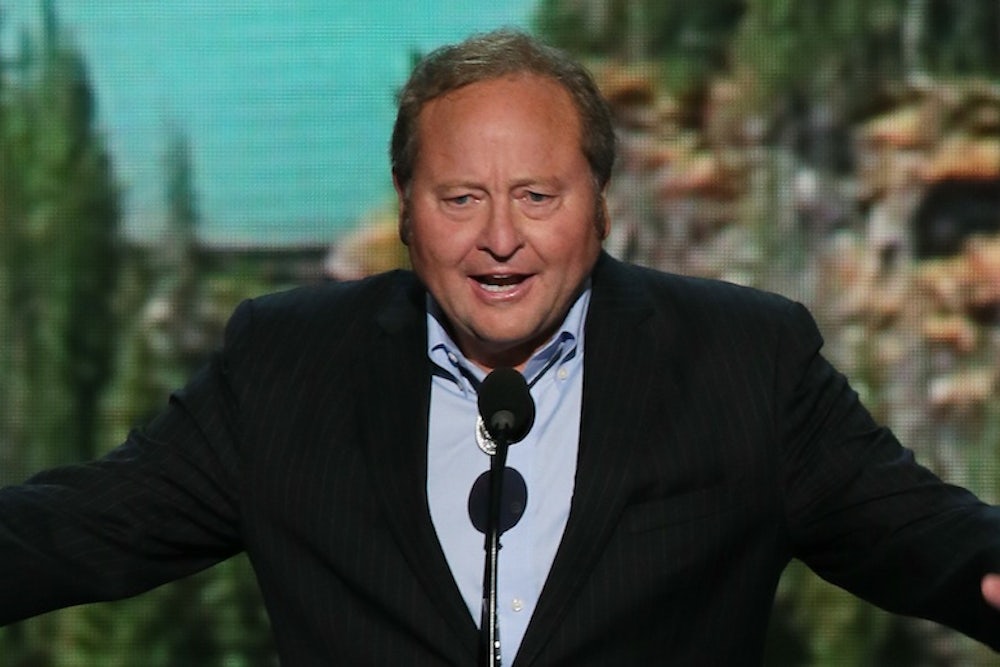For a man who says that running for President would “ruin his life,” Brian Schweitzer certainly looks to be heading in that direction. Dividing his time between rancorous stump speeches in Iowa and Sunday morning talk shows, the former governor of Montana is angling to position himself as the populist alternative to Hillary Clinton. Firing shots about her tendency to “shift hard right,” Schweitzer is trying to position himself as the progressive for 2016. After a widely-lauded speech to the Democratic Convention in 2008, Schweitzer is hoping to follow in the footsteps of an earlier convention standout who went on to win an unexpected primary against Clinton.
Despite the hype, the reality is that Schweitzer comes with a troublingly conservative record that ought to undercut populist credentials. The buzz about Schweitzer in 2016 has gone on for years, and with his recent speeches in Iowa with a pledge to visit all 99 counties there, he has finally begun to emerge as a candidate. In an interview with Slate’s David Weigel, he appears undeterred by his long-shot odds, “Ask President Ed Muskie how it worked out to be the front-runner. Ask President Howard Dean how it worked out.”
Americans tend to consume news about politics as battles, and there is a thirst for a story about a brewing primary in 2016, despite the election being years away. With Elizabeth Warren eschewing interest in 2016, there is space for someone to step forward as the alternative to Hillary. Schweitzer has filled that role with a compelling story about a Western Governor taking on the establishment candidate, who he accuses of selling out.
The problem is that the story he is selling about his own career is based on lore, not reality. While liberals may like the bolo ties and screeds about hating Washington, Schweitzer will have a difficult time selling his conservative record on guns and the environment to a primary audience.
Becoming famous as a “blue man in a red state,” Schweitzer compromised on core liberal commitments to gun control and allied himself with the NRA. In his 2008 run, Schweitzer was endorsed by the NRA with an “A” rating and a personal visit by Wayne LaPierre for a campaign rally. Schweitzer signed an array of NRA-backed bills into law, including a 2009 “stand your ground” bill that the NRA called a “victory.”
At the time, the County Attorneys association opposed the law, but Schweitzer was unwilling to part ways with his NRA supporters. The law was featured in a major New York Times investigation after the Trayvon Martin trial about Montana’s inability to prosecute a man in Kalispell, Montana for killing the husband of the woman he was having an affair with because of the stand your ground law. The Times failed to acknowledge that it was the popular Democraticic governor who signed the bill into law.
While it’s tempting to write off Schweitzer’s relationship with the NRA as a kind of compromise that Western Democrats must make in order to stay in office, it’s worth recalling that Senator Jon Tester was a supporter of the Manchin-Toomey gun control bill. Schweitzer is either a genuine conservative on gun control or, more troublingly, a candidate willing to “tack hard right” in order to get elected, as he would put it.
On the environment, Schweitzer has similarly been far to the right of the Democratic Party, and he isn’t sorry about it. He blamed “jackasses” in Washington for the delays on the building of the Keystone Pipeline. While Western Democrats have a tradition of producing some of the party’s greatest conservationists, including Secretaries of the Interior Stewart Udall and Bruce Babbitt, Schweitzer has gone the other direction. He has been one of the strongest advocates for expanding coal production, with extensive plans to ship coal to China. That plan has been met with fierce resistance from groups such as the Sierra Club. Western Democrats have a rich tradition of being the vanguards of the party’s environmentalist wing, but Schweitzer does not fit there.
Today, Schweitzer is downplaying his conservative record. But he is not in a strong position to accuse others of molding their positions to fit their political needs. As he emerges as a candidate to take on Hillary Clinton, whom many have criticized for being willing to speak to Goldman Sachs, Schweitzer will have tough questions to answer about his work with a billion dollar hedge fund, ironically named the Clinton Group, to launch a hostile takeover of a mining company where he now serves as Chairman of the Board.
There certainly is a role for Schweitzer in the Democratic Party. The party needs new faces and should embrace conservative Democrats who are growing increasingly disenchanted with a Republican Party that has swung far to the right, but he doesn't fit the role as the left-leaning candidate for 2016 that he has trying to make himself out to be.
